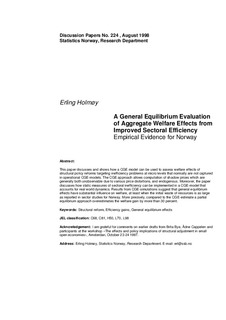A general equilibrium evaluation of aggregate welfare effects from improved sectoral efficiency . Empirical evidence for Norway
Working paper

Åpne
Permanent lenke
http://hdl.handle.net/11250/180951Utgivelsesdato
1998Metadata
Vis full innførselSamlinger
- Discussion Papers [1003]
Sammendrag
This paper discusses and shows how a CGE model can be used to assess welfare effects of structural policy reforms targeting inefficiency problems at micro levels that normally are not captured in operational CGE-models. The CGE approach allows computation of shadow prices which are generally both unobservable due to various price distortions, and endogenous. Moreover, the paper discusses how static measures of sectoral inefficiency can be implemented in a CGE-model that accounts for real world dynamics. Results from CGE-simulations suggest that general equilibrium effects have substantial influence on welfare, at least when the initial waste of resources is as large as reported in sector studies for Norway. More precisely, compared to the CGE-estimate a partial equilibrium approach overestimates the welfare gain by more than 30 percent.
Keywords: Structural reform, Efficiency gains, General equilibrium effects
Utgiver
Statistics Norway, Research DepartmentSerie
Discussion Papers;No. 224Beslektede innførsler
Viser innførsler beslektet ved tittel, forfatter og emneord.
-
The impacts of alternative policy instruments on environmental performance. A firm level study of temporary and persistent effects
Bye, Brita; Klemetsen, Marit Elisabeth (Discussion papers;788, Working paper, 2014-10)We study the effects of various environmental regulations on environmental performance measured as emission intensity. Moreover, we aim to test whether any such effects are persistent or only temporary. Conventional theory ... -
The welfare effects of carbon policies: grandfathered quotas versus differentiated taxes
Bye, Brita; Nyborg, Karine (Discussion Papers;No. 261, Working paper, 1999)Recently, it has been demonstrated that pre-existing distortionary taxes can substantially increase the costs of market-based instruments which do not raise revenue, such as non-auctioned emissions quotas. Revenue-raising ... -
Labour market rigidities and environmental tax reforms : welfare effects of different regimes
Bye, Brita (Discussion Papers;No. 242, Working paper, 1998)The working of the labour market is important for the total welfare effects of tax reforms. This paper analyses, by using a computable general equilibrium model for the Norwegian economy, how different assumptions about ...